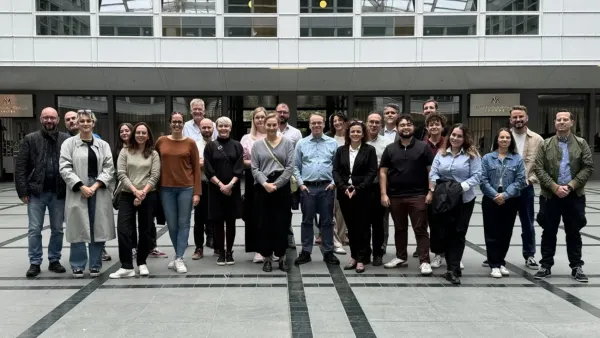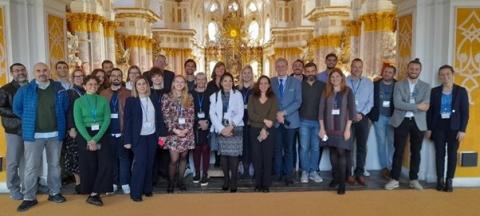
The FERMI project, in which Eviden led the task 'Swarm Learning for Holistic AI-Based Services in LEAs', concluded successfully in September 2025 after three years of collaborative work involving R&D Spain staff from the Trustworthy AI team.
A FERMI final conference was held on 16 September 2025 at Humboldt University in Berlin. The event featured three sessions covering the emerging threat landscape of disinformation in Europe, the state-of-play of technology-driven solutions — including the FERMI, Vera.ai and ATHENA platforms — and the key role of data in enabling counter-disinformation strategies.
The conference offered a comprehensive overview of the project’s results and highlighted the tools and methodologies developed to assist Law Enforcement Agencies (LEAs) in tackling disinformation-related challenges.
Outcomes
To close the project, the European Commission and the consortium organised a final review in Brussels on 5 November 2025.
During the event, the consortium presented the project outcomes, consisting of the development of a comprehensive platform to investigate, assess and mitigate the relationship between disinformation and politically motivated crime. The platform integrates advanced, AI-based tools for social media analysis, threat assessment and impact evaluation, all of which are tailored to the needs of the LEAs.
- Investigations are supported by a Spread Analyzer, which tracks the spread of illicit disinformation posts on social media. This makes it easier for law enforcement agencies to detect accounts involved in sharing these posts.
- Threat assessments are conducted by analyzing the sentiments underlying the posts and estimating the evolving crime landscape in the aftermath of a disinformation campaign.
- The broader impact of such campaigns is analyzed by estimating the economic and societal costs of disinformation-induced crime. Based on these analyses, countermeasures can be proposed for LEAs to consider.
- Moreover, a Swarm Learning framework enables LEAs to train global machine learning models collaboratively while ensuring data privacy by avoiding the need for a central server agent through which all data flows.
Challenges
The FERMI project has successfully achieved most of its expected results, delivering this comprehensive platform to analyse, assess, and counter the link between disinformation and politically motivated crime. Through three use cases —right-wing extremism in Finland, Covid-related extremism in Belgium, and left-wing extremism in Germany— the project demonstrated how disinformation dynamics can contribute to violent behavior and how AI-based tools can help Law Enforcement Agencies detect and mitigate these threats.
However, the project encountered several challenges. Accessing reliable, harmonized social media and crime datasets proved to be difficult due to legal and technical restrictions, as well as the fragmented nature of the available data. The consortium identified the need for standardized, multilingual datasets and proposed improvements to the European data-sharing framework. These include revisions to the Digital Services Act to facilitate research-oriented data access. Additionally, ensuring interoperability among technical tools while balancing usability, trustworthiness, and legal compliance required significant attention.
To overcome these challenges, the project promoted innovative approaches such as swarm learning, and reinforced a human-in-the-loop methodology to ensure that AI practices were ethical, transparent and aligned with the forthcoming AI Act. These efforts highlight the importance of combining advanced technology with robust governance, data protection, and human oversight to ensure trustworthy AI for LEAs in Europe.
Eviden's contribution and alignment
Eviden's contributions have been key to the success of the project, including designing, implementing, and continuously improving the Swarm Learning framework developed under Task 3.4. Throughout the project, the framework evolved significantly based on feedback from end-users, integrating advanced privacy-preserving techniques such as Secure Sum protocols for secure model aggregation and TLS-based encryption for end-to-end protection of communication channels. These improvements ensured the framework met FERMI's strict confidentiality, reliability, and interoperability requirements while remaining fully compliant with the GDPR and the upcoming AI Act's principles.

